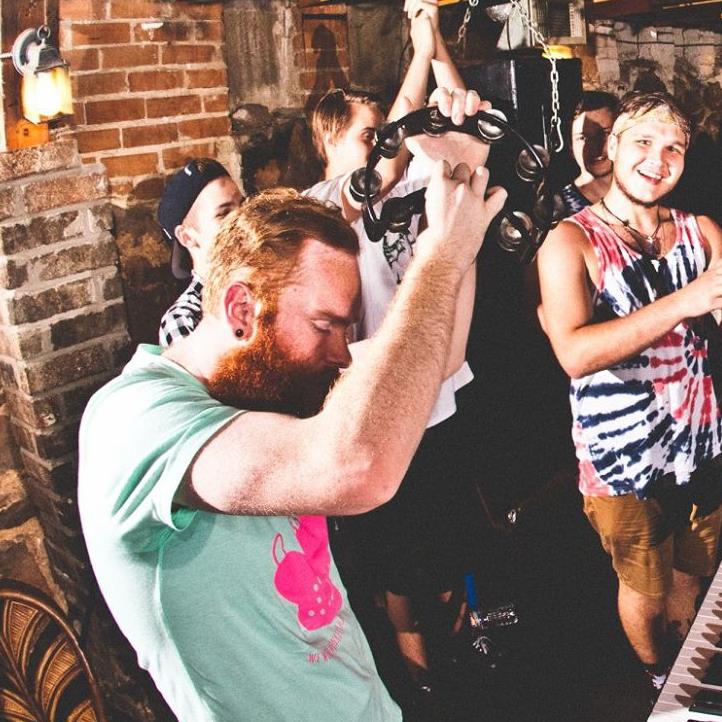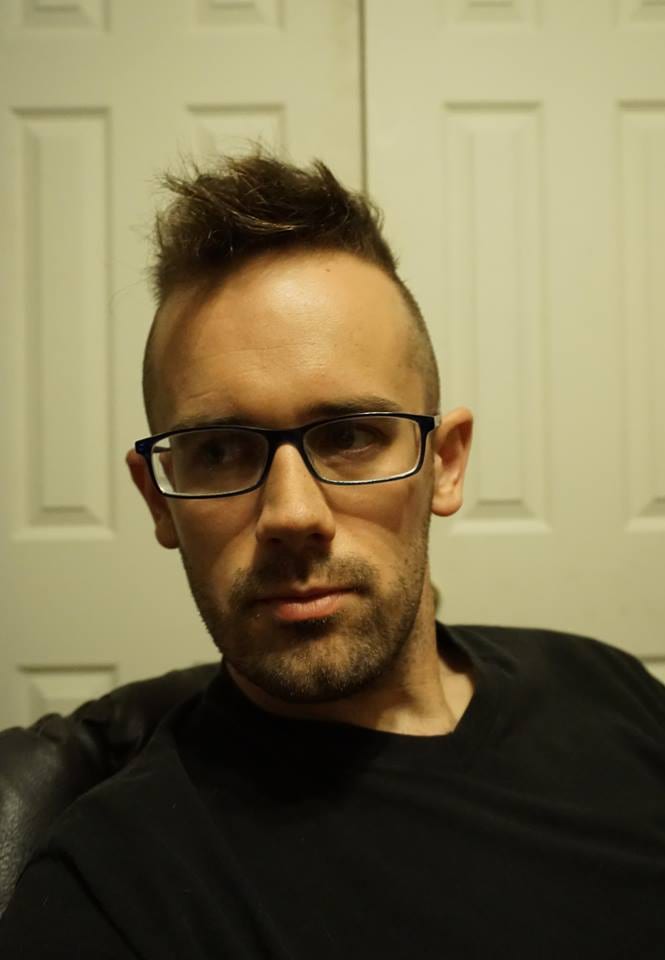The following interviews and anlayses are by Sterling Gavinski, student at SMU.
Brent Martone Interview
Brent Martone is the vocalist and guitarist of Buffalo, New York pop punk/ emo quartet Head North. On the side, Brent also is the co-founder of Quiet Fire Media, a record label/ media collective based also out of Buffalo.
Head North. On the side, Brent also is the co-founder of Quiet Fire Media, a record label/ media collective based also out of Buffalo.
Q: Did you have a business plan when you started your business?
A: We worked up to having a business plan. Before we got to the point where we put real money into it, we had a business plan. You really have to understand how to make things work, otherwise it’s just chaos in my opinion. I mean, I’m a scatter-brained person, for the most part, especially when it comes to business stuff. I’m a musician who is trying to help other musicians through Quiet Fire. I really had to sit down and reign in all my “lofty-ass” ideas.
Q: Do you think business plans are necessary for entrepreneurship?
A: My approach to my band didn’t involve a business plan. We might suffer financially from that (the majority of bands making a living off playing music have followed a business plan not all, but a good amount), but it’s more fun to just fucking rock and make music, and that’s the whole point of Head North.
Q: What three pieces of advice can you offer developing arts entrepreneurs?
A: As far as advice goes, just be as tenacious as you can possibly be, other wise there’s a million other people who will do it better. I mean we’re still absolutely tiny, but I’m proud of the moves we’ve made so far. It’s still a long, long road ahead. We just have to the dig in our heels and align ourselves with talented artists. Oh, and be good to people who are good to you. That’s basically it. I guess it depends on your goals?
Brent Martone Analysis by Sterling Gavinski:
Brent’s take on the idea of running a band via business plan was to be expected. It’s clear that he’s not totally against the idea, considering he runs his company, Quiet Fire Media, under a business plan currently. It’s interesting to see that he runs his two operations under different mantras, but it’s clear that he has a specific and efficient strategy for each. Quiet Fire books national tours for punk bands and Head North is currently opening a full US tour with internationally recognized bands. When it comes to Quiet Fire, Brent touches on the idea that once you put “real money” into a project, you have to be organized and you have to know how to “make things work.” It’s interesting to note that his band, however, “suffer[s] financially.” Brent’s most important advice was his emphasis on tenacity, as he states very clearly, “there’s a million other people who will do it better.” This advice has proven beneficial to me already in the time since our interview.
clear that he’s not totally against the idea, considering he runs his company, Quiet Fire Media, under a business plan currently. It’s interesting to see that he runs his two operations under different mantras, but it’s clear that he has a specific and efficient strategy for each. Quiet Fire books national tours for punk bands and Head North is currently opening a full US tour with internationally recognized bands. When it comes to Quiet Fire, Brent touches on the idea that once you put “real money” into a project, you have to be organized and you have to know how to “make things work.” It’s interesting to note that his band, however, “suffer[s] financially.” Brent’s most important advice was his emphasis on tenacity, as he states very clearly, “there’s a million other people who will do it better.” This advice has proven beneficial to me already in the time since our interview.
Cody Walton Interview
Cody Walton is the guitarist, keyboardist, and tambourine-player of Dallas-based pop punk band Under Dog House.
Q: Did you have a business plan when you started your business?
A: In the very beginning, we had rough plans and directions we wanted to take our business in. Goals and plans within our fiscal means were the hardest things to get worked out. After being in this type of business for a few years, you have a better understanding of how to reach attainable goals.
Q: Do you think business plans are necessary for entrepreneurship?
A: I believe that having some idea and direction for your business venture is important to make your product stand out and be known by more people. There are a lot of small steps to growing a business and they’re all stepping stones for you to grow a successful business.
Q: What three pieces of advice can you offer developing arts entrepreneurs?
A: First, it’s important to have thick skin in any medium where you’re putting a product out to the public and hoping people enjoy it. It’s impossible to please everyone so focus on who you are pleasing. Secondly, have attainable goals. Having big goals isn’t bad but it’s easy to get lost in the big picture sometimes. It’s very good for morale when you accomplish something with your team and could open up doors for more opportunities for your product. Lastly, enjoy what you’re doing with the people you’re working with. It’s extremely important everyone be on the same level of commitment and interest in your product. You don’t want people who view it as a hobby if you want something more from this. If you have a solid group, it should be fun. This is what you’re pumping your free time/extra money into so it should be something you’re eager to do. Any negative attitude or behavior could be detrimental to your business, so always find the good in things.
Cody Walton Analysis by Sterling Gavinski:
Cody’s approach to his band, Under Dog House, has changed over time. He references the fact that the more time you spend in an industry, the better you understand its quirks and how to operate within it. While Cody didn’t exactly say a business plan is entirely necessary, it was clear that he felt that planning is a huge part of a developing business. Cody’s three pieces of advice were an intelligent combination of maturity, passion and time management. Maturity comes into play especially when it comes to having realistic goals and having a thick skin. The music industry is a toxic place and, like many industries is full of naysayers and saboteurs. All three of my interviewees cited passion as a huge influence and an important aspect of any business. Without passion, a thick skin and attainable goals, according to Cody, you’ll need to rethink your plan.
Michael Briggs Interview
Q: Did you have a business plan when you started your business? 
A: I did not have a business plan when starting my recording studio, Civil Recording, or for our DIY house venue, Macaroni Island.
Q: Do you think business plans are necessary for entrepreneurship?
A: I don’t know that I would say that having a business plan is essential to having a successful business, but I’m definitely not an expert in properly running a business or the backend accounting of it all. I’m basically just winging it. Macaroni Island isn’t a real business and it’s not for profit. It doesn’t make any money. We accept donations at the shows but 100% of that goes directly to the touring bands that played the show. The recording studio is more of a sole-proprietorship business and is how I’m supporting myself currently. My approach to most everything in life is to just go for it, figure it out and don’t ask too many questions beforehand. If you’re a pretty smart person you’ll figure it out eventually. I didn’t go to school for recording, but I’m not letting that hold me back. I see it as an advantage and I’ve taught myself as I went and I have over 13 years of experience with recording now. Real world experience in any field is key and is priceless. That’s better than any formal education or classes that you can take.
Q: What three pieces of advice can you offer developing arts entrepreneurs?
A: Let me preface this by saying that this mainly goes for things in the artistic/creative spectrum and does not apply to fields such as accounting, law, medicine, etc. You actually need a degree and proper training for those things.
As far as advice for anyone looking to get into the creative field, I’d say if there’s something that interests you, just do it. Don’t subscribe to the theory that you need anyone’s permission or a certain degree or qualification. You don’t necessarily need to “pay your dues”. Just start doing whatever you want to do and if you love it enough you will most likely get pretty good at it and you can hopefully translate that into a small business and make it a career where you work for yourself and are not reliant on anyone and don’t have a boss or anyone telling you what to do. I would much rather start a small one person recording studio and/or web design agency (both of which I’m currently doing) and struggle at first just to make enough to survive but have the freedom of doing what you want when you want instead of having a 9-5 with a boss and a commute, dress code, etc. My goal in life is to never have a boss again. I played that game for 10 years and that’s long enough. I’m going to try to keep at this as long as I can. So, my advice would be to just go all in doing what you love and hopefully all of the pieces will fall into place. It may not always work but I think it’s worth a try.
Michael Briggs Analysis
While Michael seemed hesitant about the idea of a business plan, he made it clear that his knowledge of the business world is mostly self-taught. Michael’s approach is similar to Brent’s from the previous interview. Michael seems to put passion before success (financially at least). Also, despite his seemingly lackadaisical approach to the business aspects of his work, it’s clear that Michael has a very specific plan in mind when it comes to Macaroni Island and Civil Recordings. Michael’s so-called “just go for it” approach allowed him to teach himself valuable skills and try things he never would have if he had approached it within the confines of a plan (in regards to his education). This mindset is especially potent when it comes to Michael’s last point of making your goals happen (and never having a boss again).




